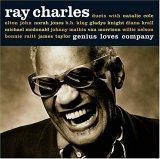Ray's Finale Makes it to Double Disc Audiophile Vinyl
Produced, recorded and performed with love and respect for the “genius of soul,”-the artist for whom musical boundaries and genres had no meaning-this album of duets is nonetheless neither an important, nor an essential Ray Charles album. That doesn't mean it isn't an immensely pleasurable one, or one not worth owning and enjoying. It's just that there are a dozen or so Charles albums that should be in your collection before you buy this one. On the other hand, this isn't exactly a bad introduction if that's what you need. Do you really need one?
Ray Charles was a blues singer, a pop star, a country crooner, a jazz man, a soul man, and more significantly, a musical pioneer, who in the 1950s laid it all out for generations of musicians by taking gospel out of the black church and secularizing it for popular consumption. His 1959 hit “What'd I Say,” filled with moans and groans, was easily the most sexually suggestive Top 10 tune ever at the time of its release. It also featured an addictive electric piano riff that slithered its way into the brains of post-Elvis rockers and subliminally affected a generation's music.
Charles's 1962 ABC-Paramount LP Modern Sounds in Country and Western Music proved that he could make just about any genre of music his own. By then he'd done a string drenched album for Atlantic The Genius of Ray Charles that won a Grammy for best vocal performance, and he'd recorded an album of jazz organ for Impulse Genius+Soul =Jazz, backed by members of Count Basie's band. Years earlier there were jazz albums on Atlantic including Soul Meeting with Milt Jackson. And of course Charles scored a big pop hit with “Hit the Road Jack.” He's done it all.
So, here's Ray's last. What it lacks in musical spark is more than made up for by the love manifest in the grooves. Side one opens joyously with Norah Jones and Ray on a relaxed “Here We Go Again,” originally recorded by Ray in 1967. The James Taylor duet on his “Sweet Potato Pie” is a bit too chipper for Ray's musical sensibilities in my opinion, but the muscular arrangement salvages it. The short side ends with Eddie Arnold's melancholic “You Don't Know Me,” which is more Ray-friendly and Diana Krall and Ray blend beautifully.
If you're not into it by now, this double disc will be a bust for you, but I don't see how any Ray fan won't enjoy at least some of the tunes on this wildly variable set. The Elton John duet, “Sorry Seems to be the Hardest Word,” misses, as does “Fever,” with Natalie Cole, but Ray and Bonnie Raitt click on “Do I Ever Cross Your Mind,” (not that the first two are bad performances, just that the chemistry isn't great).
Side three starts with one of the set's few true stunners: Ray and Willie Nelson doing a portentous, highly emotional “It Was a Very Good Year,” cushioned by a lush string section. There are also duets with B.B. King, Michael McDonald, Johnny Mathis, Gladys Knight and a closer, “Crazy Love,” with Van Morrison recorded live at “The Songwriters Hall of Fame Awards” TV show back in 2003 after Van had inducted Ray into the Hall of Fame.
A great Ray album? No. An enjoyable one? Yes. And since it's his career capper, it's one Ray fans should probably own. I saw a news report claiming that once Starbucks began selling the CD, sales soaredp-probably to many folks who didn't own any Ray Charles discs. If buying this gets them curious enough to enter the Ray Charles gold mine, it will have served a great purpose.
As for this sumptuous double vinyl disc cut from the original analog master tape, be advised that the recording was strictly digital: ProTools all the way, but mixed by the great veteran engineer and analog devotee Al Schmitt, who mixed to 30IPS analog tape, from which this record was cut.
I have not heard the CD, but based on previous experience with similar projects such as Brian Wilson's Smile, I'd bet this double vinyl set smokes the CD. While the production throughout is wonderful (Phil Ramone is not capable of doing wrong and the others do equally well), the ProTools “house sound,” does serious damage to any notions of ultimate transparency, three-dimensionality and especially shimmer and ring to cymbals. Don't expect them and you won't be disappointed. The sound is quite listenable and inviting in a “modern” sort of way. It's dynamic, well organized, and very cleanly rendered, though I was surprised by the amount of bass on the record. It almost leads the field.
Remembering that Stan Ricker is a bass player, I wondered whether he'd gotten a bit over-enthusiastic with his EQ choices, so I asked him. Stan's response? “It was transferred so flat that I even switched out the circuits on the tape preamp that allow high and low frequency trim adjustments.” So if the bass seems a bit heavy, that's what's on the tape.
Ray Charles, the ultimate crossover artist, has made the ultimate crossover. He's hit the road jack and he ain't coming back no more, so whatever the shortcomings of this set and the recording, it's still worth owning and enjoying from time to time….in between all of the great records he made during his fabulous lifetime.



